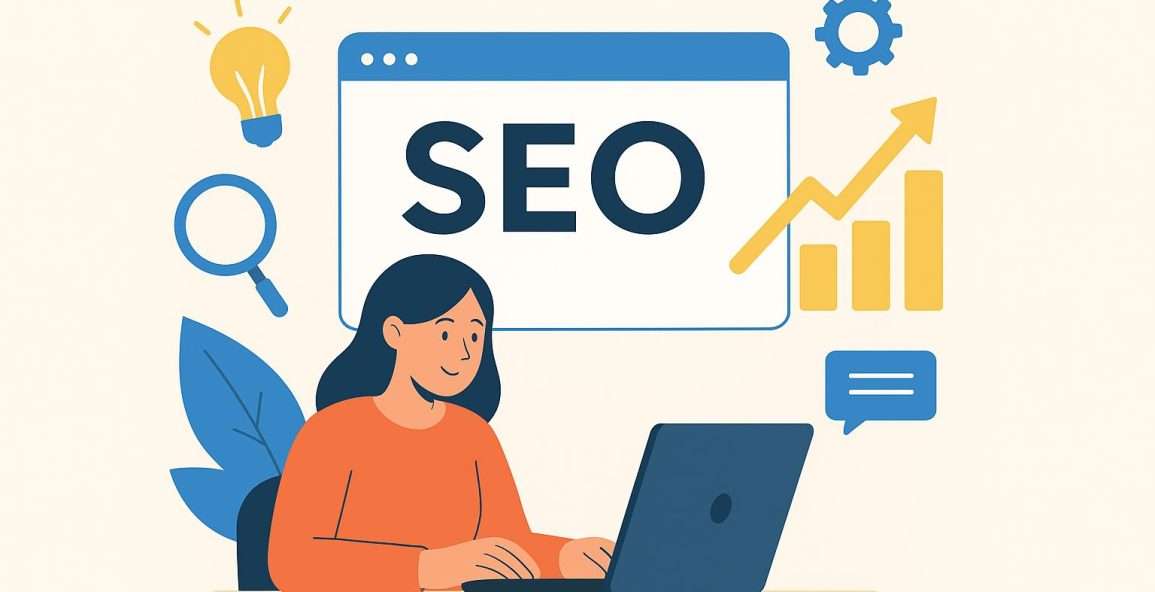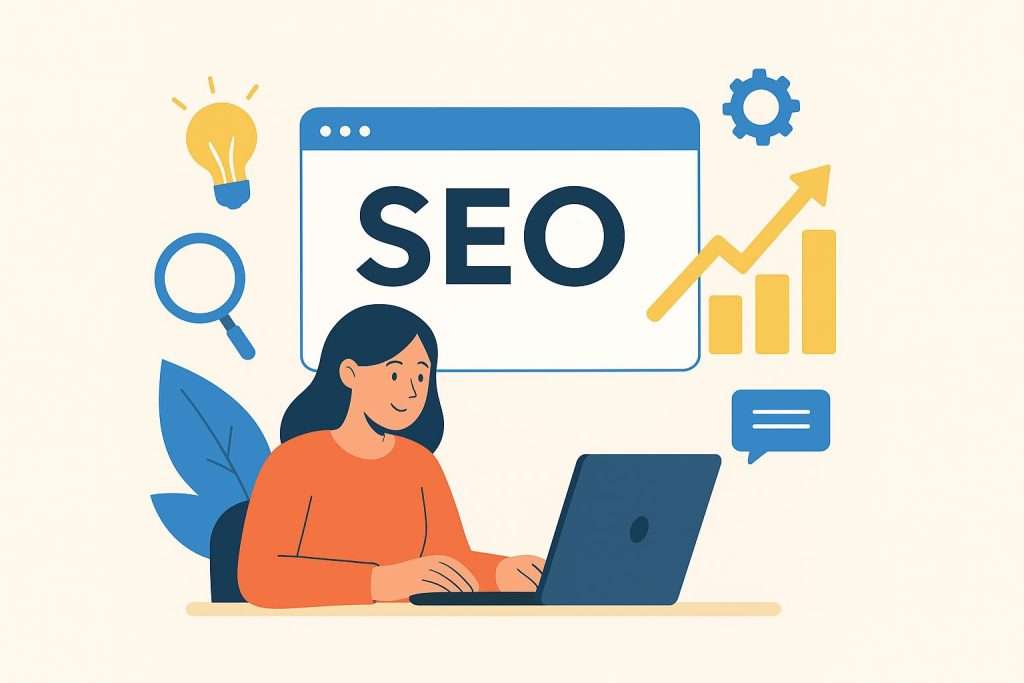
Introduction
If you’ve ever wondered how websites appear on the first page of Google, the answer lies in SEO (Search Engine Optimization). In today’s digital world, learning SEO is not just a technical skill — it’s a career-defining superpower. Whether you’re a student, entrepreneur, freelancer, or working professional, knowing how to learn SEO skills can open endless opportunities.
But with so much information online, beginners often feel lost: Where do I start? What tools should I use? Do I need an SEO course?
This guide will walk you through everything step by step — from basics to advanced strategies. Plus, we’ll highlight why professional training from institutes like BIDM – Bangalore Institute of Digital Marketing can fast-track your success.

Table of Contents
What is SEO and Why is it Important?
SEO (Search Engine Optimization) is the process of optimizing websites to improve their visibility on search engines like Google, Bing, and Yahoo.
Why should you learn SEO?
- High-demand skill: 68% of online experiences begin with a search engine (BrightEdge).
- Career opportunities: SEO specialists earn competitive salaries worldwide.
- Business growth: Proper SEO drives organic traffic without heavy ad costs.
- Freelancing & entrepreneurship: A solid SEO foundation allows you to work with clients or scale your own business.
In short, SEO helps you rank, reach, and grow.
Step-by-Step Guide: How to Learn SEO Skills
Learning SEO isn’t about memorizing definitions — it’s about applying strategies and analyzing results. Here’s the roadmap:
1. Understand the Basics of SEO
Start with the fundamentals:
- On-page SEO: Optimizing content, headings, meta tags, and URLs.
- Off-page SEO: Building backlinks, social signals, and authority.
- Technical SEO: Site speed, mobile-friendliness, and crawlability.
- Local SEO: Optimizing for local searches like “best café near me.”
👉 Pro Tip: Explore Google’s SEO Starter Guide to get a free beginner-friendly introduction.
2. Learn How Search Engines Work
Search engines use crawlers (bots) to scan websites and algorithms to rank them.
Key factors include:
- Relevance: How closely the content matches the search intent.
- Authority: Quality and number of backlinks.
- User experience: Page load speed, mobile usability, and engagement.
3. Practice Keyword Research
Keyword research is the heart of SEO. Learn to:
- Use tools like Google Keyword Planner, SEMrush, Ahrefs, and Ubersuggest.
- Identify short-tail and long-tail keywords.
- Analyze search intent (informational, navigational, transactional).
Example: Instead of targeting “SEO,” aim for “how to learn SEO skills for beginners” — less competition, higher conversions.
4. Master On-Page SEO
On-page optimization ensures your content is both user-friendly and search-engine-friendly.
Focus on:
- Writing SEO-optimized titles and meta descriptions.
- Using header tags (H1, H2, H3) correctly.
- Optimizing images with alt text.
- Internal linking for better navigation.
5. Explore Technical SEO
Even the best content won’t rank if your site isn’t technically sound. Learn to:
- Improve site speed with Google PageSpeed Insights.
- Make websites mobile-responsive.
- Fix crawl errors via Google Search Console.
- Add structured data (Schema Markup).
6. Build Quality Backlinks
Backlinks are still one of Google’s top ranking factors.
Methods to build them:
- Guest posting on relevant blogs.
- Creating share-worthy infographics.
- Submit to business directories and social bookmarking sites.
- Networking with influencers in your niche.
7. Stay Updated with Algorithm Changes
Google updates its algorithms frequently (Panda, Penguin, BERT, Helpful Content).
👉 Follow sites like Search Engine Journal, Moz, and Neil Patel’s Blog to stay ahead.
8. Use the Right SEO Tools
Investing time in SEO tools makes you smarter and faster.
Popular ones:
- SEMrush, Ahrefs, Moz → Keyword research & competitor analysis.
- Yoast SEO, Rank Math → On-page optimization for WordPress.
- Google Analytics, Search Console → Track performance.
9. Learn SEO from Experts and Courses
While self-learning is possible, structured courses provide clarity and mentorship.
That’s where BIDM – Bangalore Institute of Digital Marketing comes in.
- BIDM offers industry-recognized SEO training.
- Their courses cover theory, live projects, and real-world case studies.
- Students gain hands-on experience with premium tools.
- Alums often secure placements in top companies or start freelance careers.
If you’re serious about mastering SEO, enrolling in a professional institute like BIDM can save you years of trial and error.
10. Practice, Implement, and Experiment
SEO is 20% theory and 80% practice. Create your own blog or website and:
- Apply keyword strategies.
- Write optimized content.
- Track rankings and traffic.
- Experiment with different link-building methods.
How Long Does It Take to Learn SEO?
- 1–2 months: Basic concepts & on-page optimization.
- 3–6 months: Hands-on practice, keyword research, link-building.
- 6–12 months: Advanced SEO, algorithm updates, analytics mastery.
With the right guidance (like BIDM’s courses), you can accelerate the process significantly.
Career Opportunities After Learning SEO
Once you’ve mastered SEO, career doors open wide:
- SEO Specialist / Analyst
- Digital Marketing Manager
- Content Strategist
- Freelance SEO Consultant
- Entrepreneur (scale your own business)
According to Glassdoor, the average SEO Specialist salary in India is ₹3–7 LPA, while international salaries go much higher.
FAQs on How to Learn SEO Skills
1. What is the best way to learn SEO skills?
The best way is to start with free resources (Google, blogs), practice on your own website, and then join a structured course like those offered at BIDM – Bangalore Institute of Digital Marketing for advanced knowledge.
2. Can I learn SEO on my own?
Yes, but it takes discipline and constant learning. Free resources are helpful, but mentorship and real projects (like those provided at BIDM) accelerate progress.
3. How long does it take to become good at SEO?
With consistent practice, you can grasp SEO basics in 3 months. Mastery usually takes 6–12 months, especially if you work on live projects.
4. Do I need coding to learn SEO?
Basic HTML helps (like title tags, meta descriptions), but advanced coding isn’t mandatory. Most tools and CMS platforms (like WordPress) simplify technical SEO.
5. Which is the best institute to learn SEO in India?
BIDM – Bangalore Institute of Digital Marketing is one of the leading institutes, known for practical SEO training, expert faculty, and strong placement records.
Conclusion
Learning SEO skills is one of the smartest investments you can make today. From boosting personal blogs to building a high-paying career, SEO has limitless potential.
The first step is to learn the basics, practice often, and stay up to date. But if you want to study SEO faster, you might want to sign up for a trusted school like BIDM – Bangalore Institute of Digital Marketing. There, you’ll learn both the theory and real-world tactics that will make you ready for the job market.
If you really want to master SEO, don’t just read about it. Start using it right away and let your growth adventure begin.



